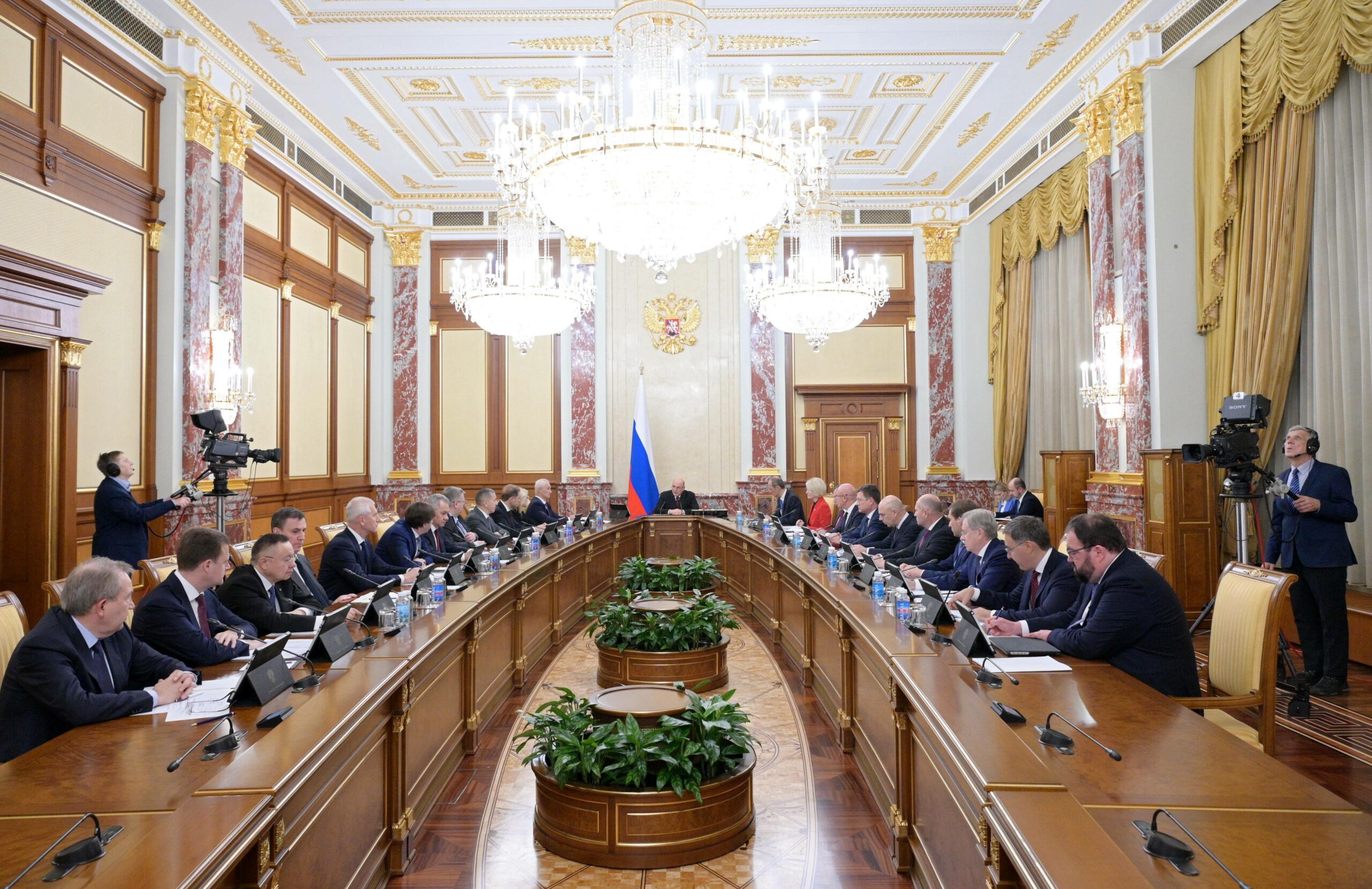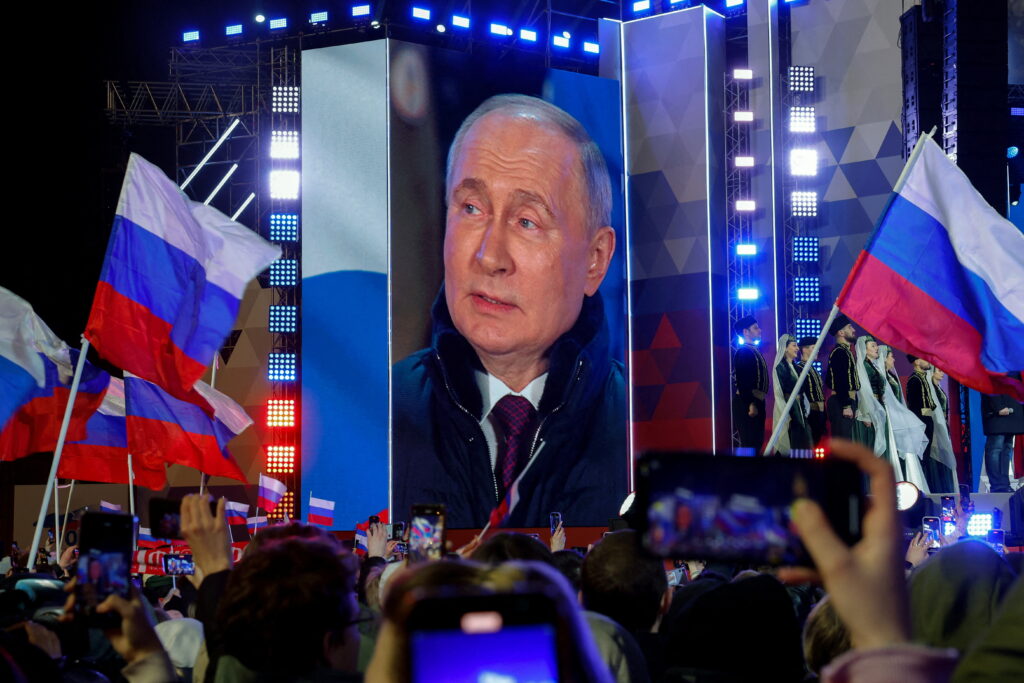For several years now, the Russian elite has lived in expectation of large-scale personnel reshuffles. This expectation is the basis of the Russian elite’s loyalty to Vladimir Putin and, at the same time, the driving force behind situational support for the war and active actions in favour of the regime, both at the top and at the lower-middle levels of the power vertical. In this context, the presidential election becomes a turning point, even though its outcome is practically predetermined. By law, Putin will have to dismiss the government and appoint a new cabinet of ministers, thus, the reshuffle seems inevitable. And so does the disappointment of the most prominent figures that keep this power vertical afloat. Putin’s staffing policy has become extremely conservative, and there are more promises s of new appointments than there are actual offices that people can compete for as a prize.
The engine of the regime
The expectation of promotion, of one’s journey up the power vertical and of material «prizes» to be acquired along the way is traditionally the main driver of Putin’s regime. Technocrats, bureaucrats, law enforcers and loyal businessmen try to get ahead by playing up to the big boss and thus boost the tenacity of the power vertical, partially through the sheer creativity and ingenuity of proposed solutions. The modus operandi of this driver is very straightforward. Every civil servant tries to be efficient in order to rise through the ranks or move to a senior position in a state-owned company, where money is more plentiful and discipline is looser. The siloviki also want to make careers and get a broader and broader mandate, and the business sector needs new controlled resources. This means not only taking action and proposing solutions, but also remaining loyal to the higher-ups.
The focal point for all these expectations is the spring of 2024 — the first months following the presidential elections. By law, the president-elect will have to dismiss the government and appoint a new cabinet of ministers. In theory, incumbent ministers could be reappointed, but elites believe that a reshuffle is almost certain to happen. Senior officials in the presidential administration and the management of state enterprises are breaking records for the length of time they have stayed in their office. The same can be said of some influential siloviki. Many bureaucrats, such as Foreign Minister Sergei Lavrov, are simply tired and asking to be allowed to retire. In this sense, the seemingly predictable presidential election is becoming not only a rallying point for the elites, but also a turning point. The elites are showing their loyalty to Putin and are certainly hoping for something in return. The entire power vertical has tensed up, waiting for what the Russian elite has recently been calling «a great reassignment or reshuffle.» But will it happen?
Years-long waiting
Large-scale personnel reshuffles were a background expectation harbored by Russian influential groups and politicians throughout 2017 and 2018. The formal reason was the 2018 presidential elections. Many members of the elite had their hearts set on positions in the Cabinet of Ministers. They had reservations about the likelihood of Prime Minister Dmitry Medvedev’s powers expanding, and not without reason: on 31 March, the Magomedov brothers, businessmen close to the head of the cabinet, were arrested. On the contrary, officials who were tired of working for the government were looking forward to a quieter and more lucrative position at the helm of one of Russia’s state-owned corporations. Part of the establishment was waiting for the «prizes», all representatives of the elite, without exception, understood that the president prefers to reshuffle the team and were waiting for the moment of this reshuffle.
Back in 2018, these expectations did not materialize. There were some reshuffles in the government, but they were one-offs, made on a personal basis. Dmitry Medvedev, for example, kept his post, and the team of technocrats and bureaucrats was virtually unchanged (apart from individual purges that affected Medvedev’s team). In 2020, Medvedev was given a sack and his place was taken by the former head of the Federal Tax Service, Mikhail Mishustin. At the same time, the media reported that other people had been the main candidates for this job, for example, Moscow mayor Sergei Sobyanin or the head of the Central Bank, Elvira Nabiullina. However, these veteran technocrats put forward their own conditions, which Putin would not or could not guarantee. It can be assumed that the heavyweights perceived the reshuffle as situational and temporary and preferred to hold on to their familiar offices. As a result, the backbone of the government remained the same, with Mishustin only taking control of the cabinet apparatus. The new ministers and deputy prime ministers came from the Moscow mayor’s office. The reshuffle did not affect law enforcement agencies and state corporations, so major personnel changes were expected after another formal occasion — the 2021 State Duma elections. For example, the departure of Vyacheslav Volodin, the speaker of the Lower House or the Duma, and his replacement by Valentina Matvienko, the speaker of the Federation Council, were expected. But the reshuffle did not take place yet again and as a result a huge personnel logjam began to form in the system.
Personnel logjam
This happened for two reasons that are possibly related. First, Putin realized that it have been alluring career prospects that forced the strong bureaucrats in his entourage — like Sobyanin or Yuri Trutnev, the envoy to the Far Eastern Federal District — to show loyalty and move the system forward. It is known that the president kept his old acquaintance, former Deputy Prime Minister Alexei Kudrin, in office by dangling the carrot of prime ministership in front of him. The post of Moscow mayor was offered at different times to Vyacheslav Volodin and Sergei Kiriyenko, though in both cases the officials were asked to wait a bit and work for the common good. After large-scale reshuffles, this energy would have been lost and replaced by entropy. Putin could have taken this into account and he probably still does.
Second, the Russian president clearly had military plans already then. It is not altogether certain that Putin was determined to go to war, but it is very likely that he had this scenario of Russia’s future among others at his disposal. Extraordinary circumstances required seasoned cadres, not newbies, to run the power vertical in times of great stress, the cadres who knew their jobs well. Again, the expectation of reshuffles worked to further boost their loyalty and motivation in the new conditions of war. Even those officials who had initially shied away from publicly endorsing the war ultimately had to rally around the flag with everybody else — after all, they want to be promoted or at least to keep their jobs.
Tactically justified moves to suspend personnel reshuffles have created a strategic problem. For every post, there are several contenders queuing for each position, and each of them has at different point been given some hopes and promises. The competition for each office has become even fiercer. Energetic deputy ministers and bureaucrats who have been sent to the regions to make careers there are now variously competing for ministerial posts. The range of potential prime ministers has become wider.
The problem is exacerbated by Putin’s conservatism when it comes to managing human resources: the president has grown old and does not want to change the core of his entourage, which consists of the most prestigious, prized positions. It is very likely that he will continue to act in the same spirit. Because of the president’s age, the value of prime minister’s job has increased manifold: it gives its owner better chance of succession, although it does not guarantee it.
As a result, the prospects and chances of the biggest part of the elites getting new opportunities during the «reassignment» look slim. Putin can predictably maintain the status quo, leaving key players in place. In addition, the president can do something even more radical: he can appoint a weak prime minister, which is quite typical of Putin’s power vertical. Putin could assign this role to one of the current government bureaucrats or his aides. Such a move would be logical in its own way. Mikhail Mishustin has become a good communicator and mediator for the elites during the pandemic, throughout Putin’s quarantine and the war. He is also a skillful public politician.
Current moves of the top management also hint at conservatism in future decisions related to staffing policy. Sberbank CEO Herman Gref has extended his term of office for four years, which means that one of the windows of opportunity has been shut. Georgy Filimonov, deputy chairman of the government of the Moscow region, a promising young official, an ultra-patriot with excellent connections went to govern the Vologda region, one of the non-prestigious regions. About a year ago, Filimonov was predicted to take over as head of the Moscow region. It is clear that at the moment Putin is only handing out compensatory jobs or extending terms of office.
The head of the Kremlin’s political bloc, Sergei Kiriyenko, recognized the new presidential rules of the game early on and acted on them promptly. He places his subordinates in different positions, retains control over his former field of work at Rosatom, but also enters other people’s fields. Kiriyenko boldly takes what he was promised and not given. However, there are no other such risk takers around besides him.
Even if some significant reshuffles are carried out, there will still be many players in the power vertical who have been given empty promises that failed to materialize. The fuel for the perpetual motion machine will run out, and the system will almost inevitably collapse into entropy, which Putin feared so much. In this sense, presidential habits and personal comfort jeopardize the very basis of his regime’s existence. The issue of personal career motives may become particularly acute at the time of the presidential election in March 2024. The Kremlin is required to strike a balance between a turnout that is credible from the point of view of the average citizen and a result that is pleasing to Putin. If the turnout is too high, protests are almost inevitable. The experience of the January 2022 events in Kazakhstan demonstrates a simple pattern. Those who are oriented towards the future go out to the squares and are ready to convince and reassure people. Those who cling to the past and want things to stay as they are, abandon their offices and run away.
For now, the elites are used to giving Putin something as an advance payment of sorts that he is almost guaranteed not to honor. The most likely successors and at the same time the «drivers» of the system — Moscow Mayor Sergei Sobyanin, Sergei Kirienko, Deputy Prime Ministers Marat Khusnullin and Yuri Trutnev, and Mikhail Mishustin — will soon hit the career ceilings due to their age. Spring 2024 will be the defining moment in their careers: if they don’t get promoted, it’s all downhill from there. Super-loyalty will become pointless, and hopes for new positions and resources will be linked not to Putin but to regime change. The only driver of the system after the presidential election will be fear, and it is unlikely to run long on that kind of fuel.










